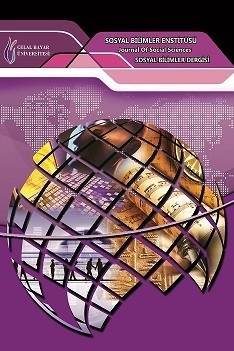SEÇİMLERİN KAMU MALİYESİ ÜZERİNDEKİ ETKİLERİ VE 2018 SEÇİMLERİ
THE EFFECTS OF ELECTIONS ON PUBLIC FINANCE AND THE 2018 ELECTIONS IN TURKEY
Author(s): Ahmet Sinan BalyemezSubject(s): National Economy, Government/Political systems, Electoral systems, Political economy, Evaluation research, Economic development, Public Finances
Published by: Celal Bayar Üniversitesi Sosyal Bilimler Enstitüsü
Keywords: Election Economy; Political Business Cycle; Political Budget Cycle; The Public Choice Theory; The Political Economy;
Summary/Abstract: In the international literature, the public financial policies during the election periods are examined within the scope of 'Public Choice Theory' and 'Political Budget Cycles’. According to this, there is a periodical change in expenditure and tax policies starting from a certain period before the elections and returning to the old level again after a certain period of time following the elections. The existence of such cyclical fluctuations has been tried to prove in a significant part of the academic literature and in the empirical studies in Turkey, as well. As distinct from the others, with this research, not only cyclical but permanent effects are emphasized by legislative acts that have come into force from the result of populist political decisions taken in the election periods and by some of the promises given to the electorates. Accordingly, it has been tried to prove statistically that elections have had a lasting impact on public expenditures as in Peacock - Wiseman Hypothesis. Similarly, due to the fact that some election promises are put into force months after the elections and some developments specific to Turkey; models that examine cyclical movements that start before the elections and end after the elections are inadequate to explain the effects of the elections on public finance. In addition, it is emphasized that within the scope of political economy theory, the relation between public finance policies and elections should not necessarily be cyclical; so, according to 'Partisan Theory', it is emphasized that the ruling parties can make populist (targeted) expenditures on voters who are close to themselves in the whole of the ruling periods. In the light of the findings of the first two parts of the research, in the last part, some evaluations are made about the 2018 Turkey elections.
Journal: Celal Bayar Üniversitesi Sosyal Bilimler Dergisi
- Issue Year: 16/2018
- Issue No: 04
- Page Range: 161-196
- Page Count: 36
- Language: Turkish

